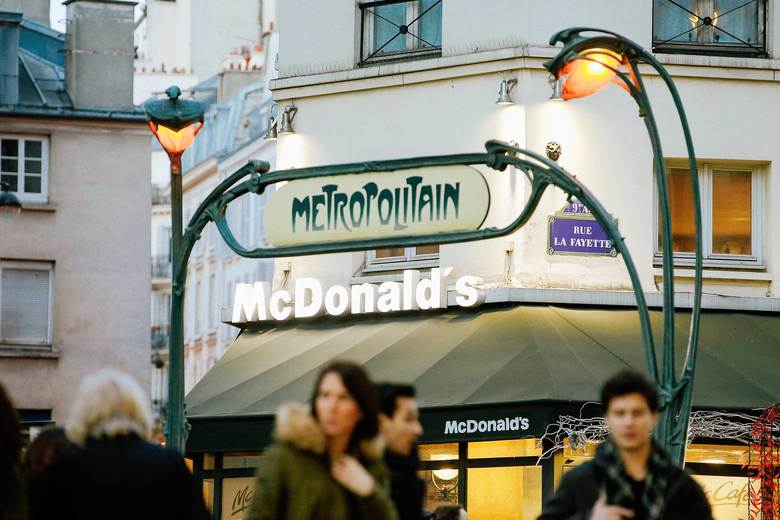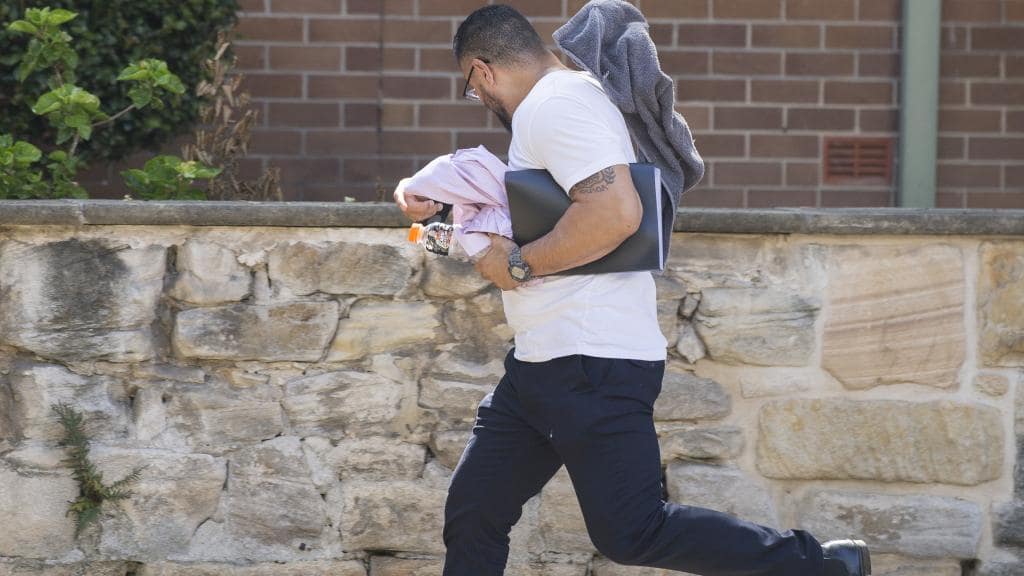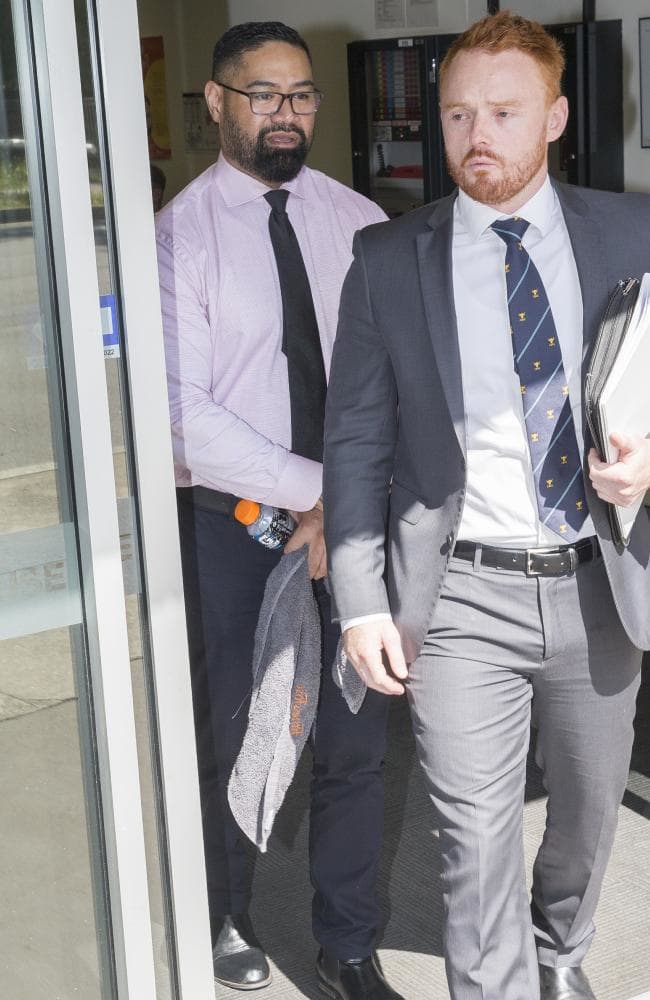You’d have charged more for ice and 1 cent worth of two types of syrup?
It’s $1 either way so no big deal - more the recipe and tracking information. Truthfully it’s a common sense thing that many are lacking - it’s not too difficult to do.
You Say You Sell “Le Big Mac,” but Why Should We Believe You?
The European Union just canceled McDonald’s trademark for Big Macs. Wait, what?
Charles StarJan 18, 20191:36 PM
A McDonald’s seen near the entrance of a Metro station in Paris in 2015., Charles Platiau/Reuters
McDonald’s sells Big Macs. I know this. You know this. If I asked you to prove it, you’d take me to the McDonald’s which is no more than a mile from where you are reading this and buy a Big Mac. And yet, last Friday, the European Union Intellectual Property Office canceled McDonald’s trademark for the Big Mac across Europe in every category, from sandwiches to “services rendered or associated with operating and franchising restaurants” because McDonald’s failed to prove that it sold sandwiches called Big Macs in Europe . It sounds so preposterous that the Washington Examiner literally did not believe it and had to retract an article in which it argued that people repeating the truth were overstating the case.
McDonald’s is … well … McDonald’s. MCDONALD’S! They sell Big Macs. They’re pretty well-known for this. I’m not going to belabor it. Less well-known is the Irish restaurant chain Supermac’s that, using myself as a survey of one, had 0 percent name recognition in the United States as of Tuesday. Faced with Supermac’s intention to expand outside of Ireland (where they apparently have co-existed without much rancor for 40 years) McDonald’s objected, arguing that the existence of continental “Supermac’s” was likely to cause customer confusion and step on McDonald’s trademark. It wasn’t even the first time they had this fight—McDonald’s filed a similar objection in 2015, which it won. Supermac’s didn’t give up, though, and when Supermac’s expansion plans in 2017 led to a new objection from McDonald’s, Supermac’s filed a petition with the EUIPO to cancel McDonald’s trademark for “Big Mac” in its entirety for an alleged failure to use said trademark.
Somehow, Supermac’s won. McDonald’s presumably very expensive counsel could not convince the EUIPO that they sell Big Macs in Europe. According to the EUIPO decision, McDonald’s submitted three affidavits which detailed McDonald’s historical Big Mac sales figures; menus listing the Big Mac; brochures and even sandwich packaging—one each from England, Germany, and France; screenshots of local McDonald’s websites in 18 countries across the EU “identifying … Big Mac sandwiches, some of which state that they are sandwiches made of beef meat.”; and a printout of the McDonald’s Wikipedia entry with its rich history of the chain’s presence in Europe—and the Big Macs it sold there.
The EUIPO’s response to McDonald’s evidence is, frankly, hilarious. To the detailed affidavits and websites that set out the Big Mac’s availability, trademark examiners brushed them off, essentially stating Of course you would say that! You’re trying to enforce a trademark!
Does that seem like an exaggeration? The ruling expressly says affidavits from the parties are “generally given less weight than independent evidence” and “all of the remaining evidence”—the websites, brochures, and sandwich packaging samples—“originates from [McDonald’s] itself.” And so the sales figures submitted in sworn testimony, the McDonald’s sandwich boxes that you know examiners had seen before on their own trays, and the screenshot of a French menu with Le Big Mac sandwich au boeuf were all so lacking in persuasiveness and credibility that the only thing McDonald’s had left was … Wikipedia. And if the EUIPO doesn’t trust sworn testimony from a trademark-holder, you can imagine what they said about Wikipedia.
When you see an outcome that is so viscerally satisfying (as I type, it’s eight hours since I first read about this and I’m still laughing at Goliath laid low), but also so clearly wrong, what do you do?
The first thing, obviously, is to tweet.
The second thing is to get a little humble. I’ve never practiced before the EUIPO, so the evidentiary rules and standards in that forum are not my wheelhouse. I would have expected that looking sternly at the examiners and saying, very slowly , “McDonald’s obviously sells Big Macs” would be compelling. One would think the examiners should nod their heads at that, remember lovin’ it and the billions and billions served, and that would be that. However, as IP expert David Fyfield, who actually practices before the EUIPO, told the World Intellectual Property Review, the EUIPO is “very particular about the evidence of use it requires for trademark registrations.”
The EUIPO’s response to McDonald’s evidence is, frankly, hilarious.
So what did they want? The ruling says that while the brochures and websites were nice, they often didn’t say where or how you could buy a Big Mac. McDonald’s didn’t submit evidence of web traffic, or proof that the brochures “led to any potential or actual purchases,” or that the Big Macs that went in the packaging “were actually offered for sale or sold.” The earlier, successful challenge to Supermac’s included brand-awareness surveys. Maybe they could have included a short video of someone going to a McDonald’s and literally ordering a Big Mac. Without that information, though, the printed materials did not “give sufficient information to support the sales and turnover figures claimed in the affidavits.”
The EUIPO actually responds to my “you can’t be serious” argument, writing a “declaration by the applicant concluding that evidence of use [of the trademark] submitted is sufficient … does not …have any effect on the Office’s findings.” In other words, it doesn’t even matter if everyone knows that McDonald’s sells burgers called Big Macs: There are ways to prove it, and McDonald’s didn’t bother. Don’t tell us, show us. There are rules, Ronald, and you will follow them.
Tarik, my pseudonymous friend and former podcast partner, had a legal-realist rule about litigation: The judge decides who the ■■■■■■■ is and works backward from there. So who was the ■■■■■■■ here? It was either Supermac’s: a local Irish fast-food chain (with a fair amount of purely coincidental menu overlap with McD’s) founded by an Irishman whose name, naturally, starts with “Mc.” Or it’s McDonald’s: a multibillion-dollar American bully that presented a defense the examiners decided could be reduced to Duh. We’re McDonald’s and had also been applying for trademarks on Supermac’s menu items. We can conclude what the EUIPO thought.
This obviously isn’t over. McDonald’s has already said it is going to appeal the decision. I don’t know the EUIPO rules of procedure, so I don’t know if McDonald’s can plug its evidentiary holes on appeal. (In the United States, introducing new facts into the record on appeal is generally frowned upon.) If they can, I feel fairly confident that somewhere across the continent, there’s evidence that someone bought a Big Mac at McDonald’s.
Until then this is, legally speaking, incredibly funny.
Have to agree with the author.
It’s funny. And a little just.
It’s as ridiculous as everyone suddenly forgetting what a MacDonald’s looks like and stumbling into a Supermac assuming it’s the same thing.
Jail officer who impersonated cop to get McDonalds discount ‘to lose his job’
A NSW Corrective Services officer who impersonated a police officer to get a discount on a McDonalds feed will likely lose his job.
Maroubra man Lawrence O’Driscoll-Faitaua, 43, appeared in Waverley Local Court on Tuesday and pleaded guilty after he asked for a police half-price discount on a large Big Mac meal and 24 chicken nuggets at a Kingsford McDonalds outlet last month.
The father, who was employed as a casual correctional officer at the Surry Hills cells, entered the drive-thru and showed a badge saying “NSW Police Force — external agency” to a cashier before ordering the meal on the afternoon of December 29.
Corrective Services officer Lawrence O’Driscoll-Faitaua dashes from Waverley Court today.
But a McDonalds manager became suspicious and questioned the card, to which O’Driscoll-Faitaua said he “attends the drive-thru at least 30 times a year and always gets a discount”, according to a police fact sheet tendered to the court.
The manager provided the discount but reported the incident to police, who later identified O’Driscoll-Faitaua on CCTV.
When he was confronted at work at Surry Hills cells days later he said he was “told by other correctional officers that this was common practice” and “expressed remorse”, according to the police facts.
In court, his defence lawyer Dominic Longhurst conceded it was likely his client would lose his job with Corrective Services.
“He’s most ashamed for not being a better role model for his young son,” Mr Longhurst said.
“As a consequence of his actions and these charges it is most likely my client’s employment with Corrective Services will be terminated and in addition it is unlikely he will be able to gain employment with the public service ever again.”
Lawrence O’Driscoll-Faitaua leaves Waverly Court with his lawyer after being charged with impersonating a police officer to get a discount at a fast food restaurant.
In sentencing, Magistrate Jacqueline Trad criticised O’Driscoll-Faitaua for his “foolish” decision which put his career on the line for a discount of only around $10.
“You’ve got to understand it’s a fine line that people step when they start flashing these things for different purposes and then the next thing and the next thing and it becomes more serious,” she said.
“(It’s a) very, very foolish action that finds you in this situation … you told officers that it was something you’ve been told about by work colleagues. The issue is of course you stand alone and (have to) face the consequences of your actions.”
O’Driscoll-Faitaua was convicted on a charge of impersonating a police officer but escaped conviction on the charge of obtaining financial advantage by deception due to the small amount of money.
Originally published as No McHappy ending for fast food police impersonator
When we wanted cheap booze for a party, we would go to the local CFA, of which we were members, and don our turnout kit and drive the trucks down to the one pub which offered firefighters a discount. Probably check a few of the fire hydrants out the front for dramatic effect…
We didn’t have a maccas within an hour, fortunately.
I used to have a car loan with Police Credit Union.
It’s amazing how often the levels of service one received improved dramatically once the attached credit card was produced.
People have an ingrained fear of the stasi
Pretty sure it’s not the Big Mac that got cancelled but a variant of it. Could be wrong of course.
can you do waffles
pretty much every fad they release was simple customisations you could do and just wait a minute extra for.
eg: chicken big mac.
Would legit eat this. Has it ever been a thing? Crispy would def be the go.
You get a Big Mac and ask for chicken patties instead…
Still my favourite custom burger…
Has anyone thanked you?
Yep. Cost a bit extra as I think the chicken patties are more expensive.
IIRC from the days I use to work there the crispy patties were like $2 each so you would be paying like $4 extra or thereabouts after swapping out the beef.
That sounds like a lot of bread



